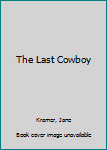The Last Cowboy
Select Format
Select Condition 
Book Overview
Portrays the life of a man who strives to be a proper cowboy despite radical changes which have propelled the Old West into a New Southwest characterized by industrialized agribusiness. This description may be from another edition of this product.
Format:Paperback
Language:English
ISBN:0140128972
ISBN13:9780140128970
Release Date:June 1991
Publisher:Penguin Group
Length:160 Pages
Weight:0.35 lbs.
Dimensions:0.5" x 5.0" x 7.8"
Customer Reviews
1 rating
Hard lives and disappointed hopes
Published by Thriftbooks.com User , 22 years ago
I think it was Larry McMurtry who made a reference to this book and got me curious enough to find a copy of it. Written in the 1970's by a writer for The New Yorker, it's very much a product of its time and reminds me in many ways of the downbeat mood of "The Last Picture Show," which dates from the same period.A work of nonfiction by a nonwesterner (Kramer lived and worked in Europe), the book does its best to deromanticize and demythologize the American cowboy and the business of ranching. She has picked as her subject a middle-aged cowboy, Henry Blanton, who has lived and worked most of his life on ranches in the Texas Panhandle. The grandson of Texas cowboys, Henry has always yearned for his own cattle ranch, but turning 40 he is still working for other men. His current employer is a well-to-do ranch owner who, according to Henry, wouldn't get out of his car if there was a cow within 100 feet. Fiercely proud, Henry is disappointed with his life and at times feels ashamed of his failed dreams. He drinks too much and with his brother Tom gets too easily into fist fights that end with broken windows, taking exception to police officers, and spending the night in jail. A skilled ranch worker, with a vast knowledge of raising cattle, Henry's role models are the men in Hollywood westerns. He emulates their strength of character and stoic self assurance. Yet Kramer finds little to admire in him, revealing his scarcely disguised racial prejudices, his chauvinism, his hatred of "hippies" and "Easterners," his rigid conservatism, his self-pity, his rage, and his envy of men who have grown rich through luck, cleverness, or anything but perseverance and hard, back-breaking physical labor. His wife Betsy, former high school cheerleader and homecoming queen, has raised four daughters in the vast, sweeping isolation of the Texas plains. Only their youngest still lives at home, an adept horsewoman and born-again Christian, who is also much attracted to boys. If Kramer shows any respect for these people, it is a pained sympathy for Betsy, who despite growing signs of depression tries to remain emotionally tough and stand by her man. Where the men and women of the West have no doubt been idealized in popular imagination, this book tries single-handedly to correct the balance. As such, it's a tough read and may seem less than even-handed. If you approach it as a story about individuals who could be living anywhere, it's a grim but compelling account of hard lives and disappointed hopes.






